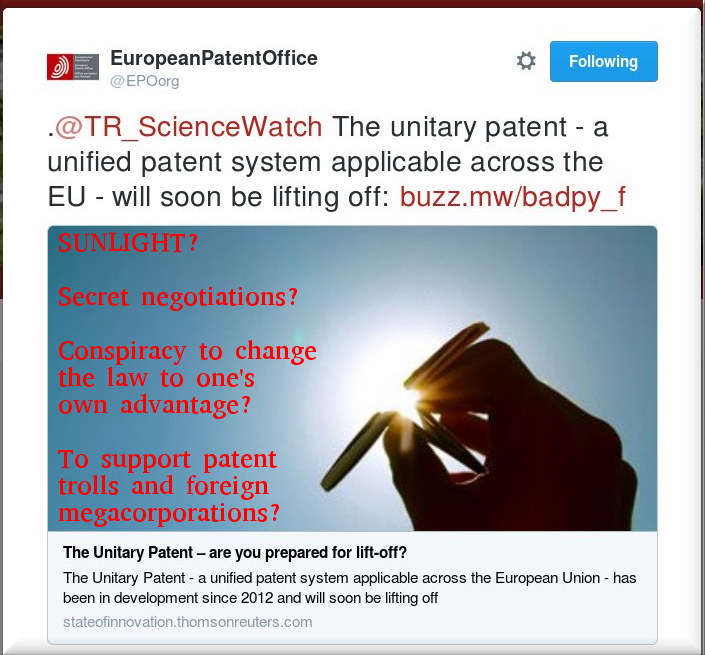

THE EPO does not mention the UPC so much anymore. In fact, it barely ever mentions it at all. Ever since the complaint in Germany got 'docketed' the cabal of Battistelli mostly hid under a rock, choosing not to comment much on the corruption involved (it was more than political stunts and gross manipulation). António Campinos will likely be more of the same regarding UPC.
"Ever since the complaint in Germany got 'docketed' the cabal of Battistelli mostly hid under a rock, choosing not to comment much on the corruption involved (it was more than political stunts and gross manipulation)."Earlier today and yesterday [1, 2] the EPO spoke of this upcoming event (warning: epo.org link) which covers, as per the page: "Update on unitary patent protection" (litigation).
"António Campinos will likely be more of the same regarding UPC.""Three days left to register for the next EPO User Day," they said. "Need a review of the formal requirements in the European patent procedure and their implications for online filing? If so, this is the event for you..."
Notice how much of a side issue UPC is; it's just one bulletpoint in a very long list. This, in our view, represents a reality wherein the EPO basically chooses not to make promises about the UPC (for fear of further embarrassment, knowing that UPC isn't coming to fruition).
"Notice how much of a side issue UPC is; it's just one bulletpoint in a very long list."But what about Team UPC? These people spent (or shall we say wasted?) many years and plenty of money crafting this horrible thing and lobbying for its passage. Bristows, for example, having just flung copies of its UPC propaganda pieces at sites like Lexology (the patent microcosm, mirroring the corporate blog of Bristows), tells us we're supposed to think that UPC will kick off soon and the only remaining question is, who's in it? That's a classic Team UPC lie which we'll see more of in a moment..
"Spanish government provides further reasons for not joining unitary patent and UPC system," says the headline. Gemma Barrett and Manuel Rey-Alvite Villar wrote towards the end something which is at least instructive:
In addition to the language regime, the Minister indicated the following were reasons for non-participation:
the uncertainty of the system’s future due to both the challenge in the German Constitutional Court and Brexit;
a Spanish company would still be able to obtain a unitary patent and enforce it (outside Spain) in the UPC; and
the higher costs of litigation in the UPC than in a Spanish court, which would be a particular problem for SMEs.
Italy is also a party to the Agreement on the Unified Patent Court (which was ratified in November 2016) and in July 2015 joined the enhanced cooperation on the unitary patent system. It has also been decided that Milan will host the Italian local division of the court.
"They are talking about the UPC in future tense/s as though it will definitely happen/materialise, but the UPC is dead in the water right now."IAM's sister site also wrote about Saudi Arabia on the same day and it was so full of patent maximalism. It's not hard to understand considering this network's funding sources. Here they go on about the GCC's "unitary patent" (not the same thing): "In 1992 the GCC approved a patent regulation that established a unitary patent right covering all GCC countries. The GCC Patent Office was established in 1992 in Riyadh, Saudi Arabia and started accepting applications in 1998. The GCC patent regulations were amended in 2000, notably adding in a novelty requirement for patentability. A GCC patent is valid and enforceable in all GCC states with no need for further validation steps."
Going back to the EU-centric "unitary patent", watch Claire Wallis, Tobias Reker and Coreena Brinck (CMS Cameron McKenna Nabarro Olswang LLP) making some dubious claims, such as:
Finally, the last hurdle the UPCA currently faces is the pending court case before the German courts as to whether the participation of Germany in the UPCA and UP is unconstitutional.
"Brexit is arguably far bigger a barrier than the constitutional complaint, which actually ties into it (Brexit is brought up as one of four core arguments).""If the German complaint is found inadmissible it is possible that the UPC may finally come into force, by the end of 2018," it concludes. Not really, that's the EPO management's talking point. And it's as misleading as can be. The EPO has been making promises like these for a number of years (projecting the start of UPC just months ahead); it was always, without exception, in vain.
REGIMBEAU's Stéphanie Celare continues to spread Team UPC's lies as well. All the above are from yesterday, just like this one. In short, the UPC simply cannot start without the UK and the UK cannot participate; that's aside from serious corruption that served to impede and ultimately stopped UPC ratification in Germany. To quote Celare:
Will the UK be part of the Unitary Patent System after Brexit? The UK's future relationship with the Unified Patent Court will be subject to negotiation with European partners as they leave the EU. Now the UK Government has ratified the UPC Agreement, it seems clear that the UK wishes to be part of the Unitary Patent System after Brexit, and to maintain a branch of the Unified Patent Court in London. Some amendment to the UPC Agreement will however be necessary to enable such a scenario.
"They try to silence those who correct them. It never ends well."This is bad legal advice if not malpractice. A lot of legal professionals have long been pointing out the same thing, whereupon Team UPC simply resorted to more flagrant censorship of blog comments. They try to silence those who correct them. It never ends well. ⬆